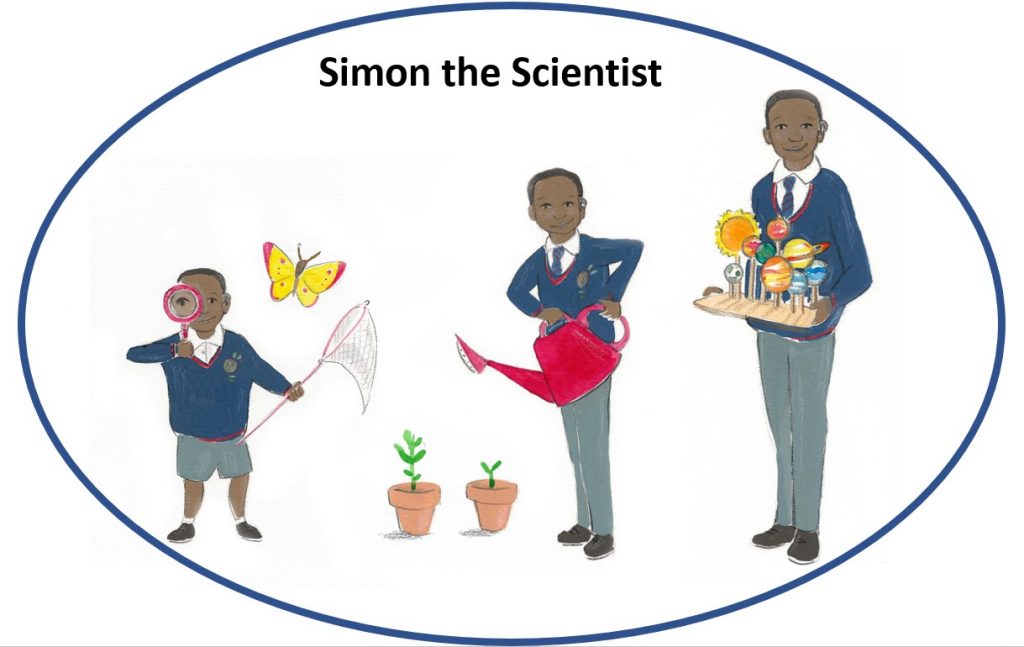
Intent: This is what we want for your child.
At Barley Fields Primary, we recognise the importance of Science in every aspect of daily life. As one of the core subjects taught in Primary Schools, we give the teaching and learning of Science the prominence it requires. Our teaching of Science is concerned with increasing children’s knowledge and understanding of our world and with developing skills associated with Science as a process of enquiry. We aim to develop children’s natural curiosity, encourage respect for living organisms and the physical environment and provide opportunities for evaluating and explaining evidence.
At Barley Fields Primary, in conjunction with the aims of the National Curriculum, our Science teaching offers opportunities for children to:
- Develop scientific knowledge and conceptual understanding through the specific disciplines of Biology, Chemistry and Physics;
- Develop understanding of the nature, processes and methods of Science through different types of science enquiries that help them to answer scientific questions about the world around them;
- Be equipped with the scientific knowledge required to understand the uses and implications of Science, today and for the future.
- Develop the essential scientific enquiry skills to deepen their scientific knowledge.
- Develop a respect for the materials and equipment they handle with regard to their own, and other children’s safety.
- Develop an enthusiasm and enjoyment of scientific learning and discovery.
At Barley Fields Primary, we aim to give all children a strong understanding of the world around them whilst acquiring specific skills and knowledge to help them to think scientifically. We plan our teaching themes around the three scientific disciplines; Biology, Chemistry and Physics. We want children to gain an understanding of scientific processes and an awareness of the uses and implications of Science, today and for the future.
Implementation: How will this look in the classroom.
Our children follow a carefully structured Science curriculum which is designed to ensure children know more, do more and remember more as they progress through school. Scientific enquiry skills are embedded into each topic and these are enhanced, revisited and developed throughout their time in school. Our teaching approach allows children to build upon their prior knowledge and increase their enthusiasm for Science whilst embedding knowledge into the long-term memory. All children are encouraged to develop and use a range of Scientific skills including making observations, planning and completing investigations, as well as being encouraged to ask questions about the world around them.
Our Teaching Approach
Science is taught in blocks of lessons to ensure children have opportunities for a sustained period of study and have time to embed and enhance their learning. We have developed detailed medium-term planning which supports teaching, ensures continuity and carefully plans for progression and depth. This medium-term planning also underpins appropriate teaching pedagogy for effective quality first teaching in Science and ensures learning is practical and hands on. Specialist vocabulary linked to our Science topics is taught and built up, and effective questioning encouraged. Concepts are reinforced by focusing on the key features of scientific enquiry, so that children learn to use a variety of approaches to answer relevant scientific questions.
Our children understand the core skills they need to learn in Science with the use of the school curriculum character – Simon the Scientist. This character is regularly used to encourage children to reflect on the key skills, attitudes and knowledge needed when learning across the Science curriculum.

Full details of our curriculum long term schemes of learning and curriculum pathways can be downloaded below.
Impact: How will we know that our children are achieving?
By the end of each key stage, children are expected to know, apply and understand the skills and techniques specified in the Science curriculum plans.
Pupils’ are assessed using our SONAR tracking system which identifies clear and progressive end points. This ensures progress is maintained and end of key stage expectations are met by all children. Children are assessed termly and a final summative assessment made at the end of the academic year. Children will be assessed as either Emerging, Developing, Secure or Exceeding, in accordance with Age Related Expectations.
In addition, we measure the impact of our curriculum through the following methods:
- A reflection on standards achieved against the planned outcomes;
- A celebration of learning for each term which demonstrates progression across the school (Curriculum Floor book);
- Tracking of knowledge in pre and post learning activities;
- Pupil discussions about their learning (Pupil Voice);
- The annual tracking of standards across the curriculum. In KS1 and KS2
